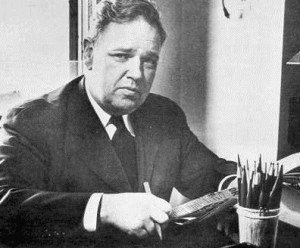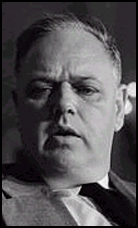 The year: 1938. The occasion: a meeting between Whittaker Chambers, who had, at great peril, left the American communist underground, and General Walter Krivitsky, a defector from Stalin’s secret police. This meeting was instrumental in helping Chambers decide to inform on his former underground associates, and eventually led to the front-page drama of the Chambers-Hiss controversy from 1948-1950.
The year: 1938. The occasion: a meeting between Whittaker Chambers, who had, at great peril, left the American communist underground, and General Walter Krivitsky, a defector from Stalin’s secret police. This meeting was instrumental in helping Chambers decide to inform on his former underground associates, and eventually led to the front-page drama of the Chambers-Hiss controversy from 1948-1950.
Chambers was hesitant to talk with Krivitsky. He knew it might lead to that fateful decision that would change the rest of his life, bringing untold misery and anguish to his family and destroying his budding career as a writer for Time magazine. He reluctantly agreed to the meeting, and it became a pivotal event in his life.
Krivitsky challenged Chambers to take a stand against the forces of the communist revolution. As Chambers relates in his classic autobiography Witness, “Krivitsky said one or two things that were to take root in my mind and deeply to influence my conduct, for they seemed to correspond to the reality of my position.” Chambers focuses on one in particular—Krivitsky’s contention that, in the struggle taking place between totalitarianism and liberty, there are only revolutionists and counterrevolutionists.
Victory against the communists/fascists/totalitarians, Chambers concluded, will only come via an active counterrevolution, not through a passive conservatism. Here’s how he phrased it:
Counterrevolution and conservatism have little in common. In the struggle against Communism the conservative is all but helpless. For that struggle cannot be fought, much less won, or even understood, except in terms of total sacrifice. And the conservative is suspicious of sacrifice; he wishes first to conserve, above all what he is and what he has. You cannot fight against revolutions so.
There is much wisdom in those comments. “Conservative” is a fluid term. I can say I am a conservative because I want to maintain the original spirit and letter of the Constitution and America’s founding principles. A Russian conservative, on the other hand, would want to conserve the old Soviet ways.
Chambers’s words still apply today. We may not be faced with an external Soviet Union, but the totalitarian spirit remains. “Fascism,” Chambers explained, “is inherent in every collectivist form.” Modern liberalism/progressivism is a form of fascism due to its inherent desire to make everyone conform to its tenets.
This is why Christians are told they must accept the cultural revolution that heralds abortion on demand, same-sex marriage, and the withdrawal of Christian faith to within the walls of an external structure that the world calls “the church.”
But the church is not an external structure. It is the aggregate of all true believers who have been told by their Lord to take the faith into all areas of society. If we are passive, if we allow the society to lurch toward moral depravity without a counterbalancing message and the courage to proclaim that message, we are no more than timid conservatives who seek to retain what we have.
God has called us to more than that. We are the new counterrevolutionaries. We are the ones with the message of life. We are accountable for how we spread that message to our society.
 Whittaker Chambers did what he had to do in his day, and he suffered for it. Yet what he did was essential to the preservation of liberty and the recognition of Western civilization’s debt to the Christian faith.
Whittaker Chambers did what he had to do in his day, and he suffered for it. Yet what he did was essential to the preservation of liberty and the recognition of Western civilization’s debt to the Christian faith.
Chambers instructs us that this battle “can be fought only by the force of an intelligence, a faith, a courage, a self-sacrifice, which must equal the revolutionary spirit” of the enemies of Christian faith and liberty.
Will we go forward in our day with the same courage Chambers exhibited? If we do, be assured there will be suffering. Yet action on our part is absolutely essential if we hope to turn the tide.
